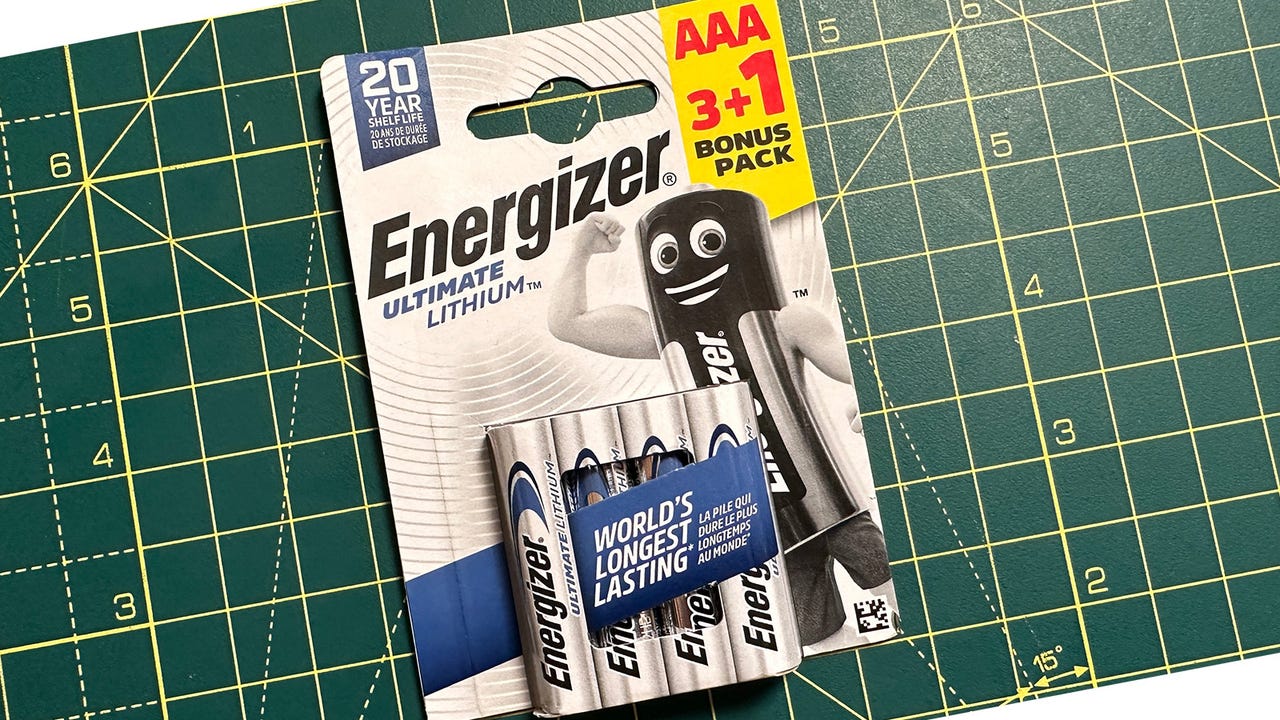I’ve tested a lot of AA and AAA batteries, and these are my favorites
I’m a big fan of rechargeable batteries, and that extends to the AA and AAA batteries found in myriad devices found around the home. I don’t want to be throwing used batteries into the recycling bin, and I can save a whole bunch of money by buying a good quality NiMH rechargeable batteries and charger.
But there are times when only disposable batteries will do.
Also: The 10 best early Black Friday 2023 portable power station deals
Rechargeable batteries, you see, have a downside: As soon as you remove the battery from its charger, the battery slowly starts to discharge. Give it several months to a year, and your fully charged battery will be quite depleted.
This is not a problem in most applications, because you rarely need to keep rechargeable batteries on charge for extended periods of time. But if you do need backups, then rechargeable AA and AAA batteries aren’t a good choice.
These tick all the boxes for me:
- 20-year shelf life
- Designed to perform in extreme temperatures, from -40°F to 140°F
- Leak-proof construction
- 33% lighter than alkaline batteries (AA/AAA)
- Last up to seven times longer than alkaline batteries
Another problem is the cold.
Cold weather zaps rechargeable batteries. Again, not a big problem if you’re using them to power a TV remote or a computer mouse in your living room or bedroom; but if you’re taking them outdoors, or using them in a cold workshop or garage, this can be a big problem.
So what’s the solution if you want batteries that have a long shelf life and can withstand cold temperatures?
You need lithium batteries. And after testing a whole bunch of them over the years, the ones I’ve settled on are Energizer Ultimate Lithium batteries.
I have a few of these as backups for mission-critical stuff (such as my Petzl Tactikka+ headlamp, which normally runs off a bespoke rechargeable battery, but I carry three Energizer Ultimate Lithium AAA batteries just in case), and they’ve never let me down. I have some that have been in a car, truck, backpack, or luggage for years, and they’re always ready for use.
Also: The best rechargeable batteries you can buy
You might be wondering what made me buy these in the first place. Yes, you guessed it: My headlamp was dying at a bad time while I was coming down from the hills from a long hike.
I usually keep these batteries in their packaging, but I also have some Thyrm CellVault battery holder tubes that are excellent for protecting these batteries from harm, especially when outdoors.
These batteries come in AA, AAA, and 9V sizes. Yes, they’re pricy compared to regular alkaline and rechargeable batteries, but in an emergency, the pain of the cost evaporates.

I’m a big fan of rechargeable batteries, and that extends to the AA and AAA batteries found in myriad devices found around the home. I don’t want to be throwing used batteries into the recycling bin, and I can save a whole bunch of money by buying a good quality NiMH rechargeable batteries and charger.
But there are times when only disposable batteries will do.
Also: The 10 best early Black Friday 2023 portable power station deals
Rechargeable batteries, you see, have a downside: As soon as you remove the battery from its charger, the battery slowly starts to discharge. Give it several months to a year, and your fully charged battery will be quite depleted.
This is not a problem in most applications, because you rarely need to keep rechargeable batteries on charge for extended periods of time. But if you do need backups, then rechargeable AA and AAA batteries aren’t a good choice.
These tick all the boxes for me:
- 20-year shelf life
- Designed to perform in extreme temperatures, from -40°F to 140°F
- Leak-proof construction
- 33% lighter than alkaline batteries (AA/AAA)
- Last up to seven times longer than alkaline batteries
Another problem is the cold.
Cold weather zaps rechargeable batteries. Again, not a big problem if you’re using them to power a TV remote or a computer mouse in your living room or bedroom; but if you’re taking them outdoors, or using them in a cold workshop or garage, this can be a big problem.
So what’s the solution if you want batteries that have a long shelf life and can withstand cold temperatures?
You need lithium batteries. And after testing a whole bunch of them over the years, the ones I’ve settled on are Energizer Ultimate Lithium batteries.
I have a few of these as backups for mission-critical stuff (such as my Petzl Tactikka+ headlamp, which normally runs off a bespoke rechargeable battery, but I carry three Energizer Ultimate Lithium AAA batteries just in case), and they’ve never let me down. I have some that have been in a car, truck, backpack, or luggage for years, and they’re always ready for use.
Also: The best rechargeable batteries you can buy
You might be wondering what made me buy these in the first place. Yes, you guessed it: My headlamp was dying at a bad time while I was coming down from the hills from a long hike.
I usually keep these batteries in their packaging, but I also have some Thyrm CellVault battery holder tubes that are excellent for protecting these batteries from harm, especially when outdoors.
These batteries come in AA, AAA, and 9V sizes. Yes, they’re pricy compared to regular alkaline and rechargeable batteries, but in an emergency, the pain of the cost evaporates.
